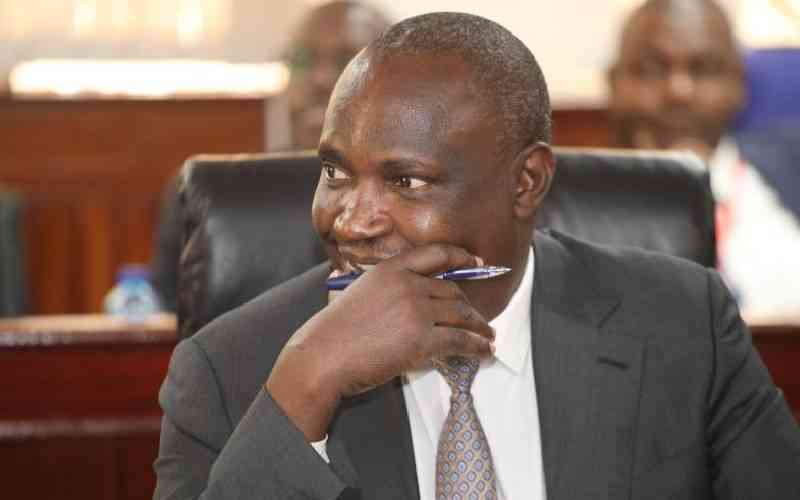Treasury Cabinet Secretary John Mbadi has defended the government’s proposed plan on the privatisation of Kenya Pipeline Company (KPC), saying it will free the firm from tight state budgets.
He says that privatisation would be more advantageous, providing a source of revenue to the government, unlocking billions in investment, and giving an ordinary Kenyan a chance to own a stake in one of the region’s biggest petroleum movers.
Speaking before a parliamentary committee on Monday,11 in Nairobi, Mbadi said the initial public share sale would not only cut domestic debt and boost economic growth, but also position Kenya as a regional energy hub, while safeguarding transparency and protecting small investors.
Follow The Standard
channel
on WhatsApp
“The proposed Listing of KPC is a clear reflection of the growing strength and maturity of our economy, and thís IPO ís well positioned to support not just the financing of our 2025/2026 budget but will also usher in KPC into a new paradigm of heightened corporate governance and transparency,” said Mbadi.
“Our economy is at a critical turning point, and to sustain the economic achievements realized thus far, both from a macro and fiscal (inflation, interest rates, currency stabilization, GDP growth) perspectives we must turn to innovative financing mechanisms to fund infrastructure and public service projects,” stated Mbadi.
He pointed out that privatisation has been a key factor and a critical tool in addressing infrastructure gaps, enhancing service delivery, and promoting sustainable development, highlighting success from privatised companies such as KenGen which, Safaricom and KCB.
“We have identified privatization as a key tool to address the following three major economic balances: government debt, budget balances and economic stimulation,” said Mbadi.
The CS said that currently, KPC is projected to produce a revenue of Ksh100 billion from the proposed Initial Public Offering (IPO), and the valuation of the company based on the last audited accounts is about Ksh120 billion.
He pledged that the new management will cause no disruption to both services and delivery, saying that those who will be affected will be compensated accordingly.
During the 2025/2026 budget-making process, the national Treasury disclosed that revenue-raising measures shall include privatization to the tune of Ksh149 billion.
Follow The Standard
channel
on WhatsApp
Treasury Cabinet Secretary John Mbadi has defended the
government’s proposed plan
on the privatisation of Kenya Pipeline Company (KPC), saying it will free the firm from tight state budgets.
He says that privatisation would be more advantageous, providing a source of revenue to the government, unlocking billions in investment, and giving an ordinary Kenyan a chance to own a stake in one of the region’s biggest petroleum movers.
Speaking before a parliamentary committee on Monday,11 in Nairobi, Mbadi said the initial public share sale would not only cut domestic debt and boost economic growth, but also position Kenya as a regional energy hub, while safeguarding transparency and protecting small investors.
Follow The Standard
channel
on WhatsApp
“The proposed Listing of KPC is a clear reflection of the growing strength and maturity of our economy, and thís IPO ís well positioned to support not just the financing of our 2025/2026 budget but will also usher in KPC into a new paradigm of heightened corporate governance and transparency,” said Mbadi.
“Our economy is at a critical turning point, and to sustain the economic achievements realized thus far, both from a macro and fiscal (inflation, interest rates, currency stabilization, GDP growth) perspectives we must turn to innovative financing mechanisms to fund infrastructure and public service projects,” stated Mbadi.
He pointed out that privatisation has been a key factor and a critical tool in addressing infrastructure gaps, enhancing service delivery, and promoting sustainable development, highlighting success from privatised companies such as KenGen which, Safaricom and KCB.
“We have identified privatization as a key tool to address the following three major economic balances: government debt, budget balances and economic stimulation,” said Mbadi.
The CS said that currently,
KPC is projected
to produce a revenue of Ksh100 billion from the proposed Initial Public Offering (IPO), and the valuation of the company based on the last audited accounts is about Ksh120 billion.
He pledged that the new management will cause no disruption to both services and delivery, saying that those who will be affected will be compensated accordingly.
During the 2025/2026 budget-making process, the national Treasury disclosed that revenue-raising measures shall include privatization to the tune of Ksh149 billion.
Follow The Standard
channel
on WhatsApp
By Mourice Odiwuor
